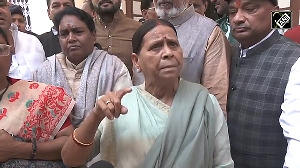Mohamed ElBaradei and the International Atomic Energy Agency that he heads won the 2005 Nobel Peace Prize on Friday for their efforts to prevent the proliferation of nuclear weapons.
ElBaradei, an Egyptian lawyer, has headed the United Nations nuclear agency as it grappled with the crisis in Iraq and the ongoing efforts to prevent North Korea and Iran from acquiring nuclear weapons.
"Everyone who has contributed to the IAEA has a part in this important prize,'' Nobel committee chairman Geir Lundestad said as he announced the prize.
The Nobel Committee was recognising "...their efforts to prevent nuclear energy from being used for miitary purposes and to ensure that nuclear energy for peaceful purposes used in the safest possible way."
ElBaradei and the agency have been among the favourites to win the prize in the days leading up to the announcement as speculation mounted that the Nobel committee would seek to honour the victims of nuclear weapons and those who try to contain their use.
A record 199 nominations were received for the prize, which includes 1.3 million dollars, a gold medal and a diploma. ElBaradei and the IAEA will share the award when they receive it on December 10 in the Norwegian capital.
In Vienna, where the agency is based, IAEA spokeswoman Melissa Fleming said, "This is the proudest moment of my career at the IAEA. I never thought we'd see this day. This is the proudest day for the IAEA. We are proud, astonished, elated. For an organisation like us there is no prouder award.''
The Nobel Committee said ElBaradei and the agency should be recognised for addressing one of the greatest dangers facing the world.
"At a time when the threat of nuclear arms is again increasing, the Norwegian Nobel Committee wishes to underline that this threat must be met through the broadest possible international cooperation. This principle finds its clearest
expression today in the work of the IAEA and it director general.''
"In the nuclear non-proliferaton regime, it is the IAEA which makes sure that nuclear energy is not misused for military purposes, and the director general has stood out as an unafraid advocate of new measures to strengthen that regime.
"At a time when disarmament efforts appear deadlocked, when there is a danger that nuclear arms will spread both to states and to terrorist groups, and when nuclear power again appears to be playing an increasingly significant role, IAEA's work is of incalculable importance.''
Former chief UN weapons inspector Hans Blix told The Associated Press in Stockholm that as a friend and colleague of ElBaradei, he was "very happy on his behalf.''
"It is very encouraging and fortunate,'' Blix said. "I see it as an endorsement of the professional and independent role of the IAEA and of international verification in the field of nuclear power and non-proliferation.''
Blix said the IAEA is best equipped to deal with nuclear situations such as those in Iran and North Korea.
Also Read: Nobel Laureate as guinea pig






 © 2025
© 2025